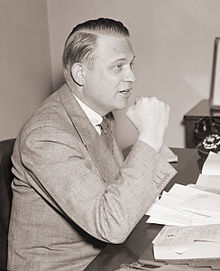Martin Dies Jr.
| Martin Dies Jr. | |
|---|---|
 |
|
| Member of the U.S. House of Representatives from Texas's 2nd district |
|
|
In office March 4, 1931 – January 3, 1945 |
|
| Preceded by | John Calvin Box |
| Succeeded by | Jesse Martin Combs |
| Member of the U.S. House of Representatives from Texas's At-large district |
|
|
In office January 3, 1953 – January 3, 1959 |
|
| Preceded by | District created |
| Succeeded by | District abolished |
| Chairman of the House Committee Investigating Un-American Activities | |
|
In office 1938–1944 |
|
| Preceded by | None |
| Succeeded by | Edward J. Hart (1945) |
| Member of the Texas Senate from District 3 (Lufkin) | |
|
In office 1959–1967 |
|
| Preceded by | Ottis E. Lock |
| Succeeded by | Charles Wilson |
| Personal details | |
| Born | November 5, 1900 Colorado City, Texas |
| Died | November 14, 1972 (aged 72) Lufkin, Texas |
| Political party | Democratic |
| Parents | Martin Dies Sr. |
Martin Dies Jr. (November 5, 1900 – November 14, 1972) was a Texas politician and a Democratic member of the United States House of Representatives. He was elected as a Democrat to the Seventy-second and after that to the six succeeding Congresses (March 4, 1931 – January 3, 1945). In 1944, Dies did not seek renomination to the Seventy-ninth Congress, but was elected to the Eighty-third and to the two succeeding Congresses (January 3, 1953 – January 3, 1959). Again, he did not seek renomination in 1958 to the Eighty-sixth Congress. In 1941 and 1957, he was twice defeated for the nomination to fill a vacancy in the United States Senate. Dies served as the first chairman of the Special Committee to Investigate Un-American Activities (Seventy-fifth through Seventy-eighth Congresses).
He was born in Colorado City, Texas on November 5, 1900, to Martin Dies Sr., who was a member of the United States House of Representatives from 1901 to 1919. He studied at the University of Texas and obtained a Bachelor of Laws degree at the National University School of Law, Washington, D.C. Dies worked as an attorney in Marshall, Texas and Orange, Texas and eventually became a district judge. In 1931, Dies was elected from Texas 2nd District to the House of Representatives, a constituency that his father represented for a decade, thus becoming a second generation Democratic U.S. congressman.
Due to the support of a fellow Texan John Nance Garner, he became a member of the important House Rules Committee. At the beginning, Dies fully supported the New Deal as it aimed to provide relief for the distressed rural areas, which he represented in Congress. However, being a conservative Southerner, he turned against it after the 1936 election, when labor unions started to play a much bigger role in national politics.
...
Wikipedia
